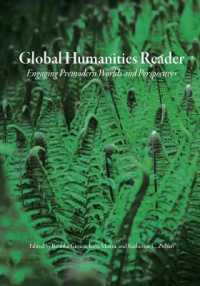- ホーム
- > 洋書
- > 英文書
- > Nature / Ecology
Full Description
Food microbiology is the science that comprises the details about various microorganisms associated with food in beneficial and harmful aspects. Spoilage of food by microorganisms has become a problem for many people around the world as foods act as a nutrient source for microorganisms. The past ten years have seen a shift in the field of epidemiology of microbial illness caused by food. This shift has been attributed to the emergence of newly identified foodborne pathogens as well as to changes in lifestyle factors, such as convenience foods, more adventurous eating, and less time spent preparing meals. It is critical to control foodborne illnesses at every stage of the supply chain, from food manufacturing and preparation to customer delivery. Foodborne hazard control can be aided by both established technology and novel strategies like Hazard Analysis Critical Control Point (HACCP) programs and radiation hazard analysis. However, rising microbiological food safety concerns will remain a major public health concern because of microorganisms and the continual evolution of products, processes, and food handling methods.
KEY FEATURES
To understand the basic information and applied aspects of food microbiology.
To provide comprehensive knowledge about food spoilage and foodborne pathogens.
To update readers with modernized food preservation methods and the biotechnology involved, along with quality control standards.
To describe the latest research ongoing in food fermentation, food safety standards, and emerging issues in the field.
This book is designed for students and research scientists working in the field of food safety and food microbiology, including graduate and postgraduate students, scholars, academicians, scientists, and professionals in food and dairy technology, life sciences, agriculture, pharmaceutical sciences, and biomedical sciences.
Contents
1. Introduction to Food Microbiology 2. Microbiome of Fresh Fruits and Vegetables 3. An Overview of Microflora in Dairy and Meat Products 4. Fungi as Phytopathogens in Fruits and Vegetables: Emerging Control Methods 5. Bacteriological Spoilage and Detection of Food Products 6. Fungal Spoilage and Detection in Food Products 7. Mycotoxins in Cheese: Types, Sources and Controlling Strategies 8. Conventional Techniques of Food Preservation 9. Recent Developments in Food Preservation Techniques 10. Microbial Dynamics: Classification and Functional Roles in Fermented Foods 11. Food Factors Influencing Microbial Development 12. Combating Foodborne Fungal Infections: Diagnostics, Control Measures and Future Directions 13. Safeguarding Public Health: Effective Management and Emerging Solutions for Foodborne Viral Diseases 14. Foodborne Parasitic Diseases Diagnostics and Control Measures 15. Antimicrobial Resistance in Poultry Pathogens: Implications for Food Safety and the Need for Enhanced Quality Control Standards 16. A Closer Look at Food Testing Agencies, Acts, Regulations and Patents 17. Microbial Contribution to Fermented Foods and Quality Enhancement 18. Food Protein Production Through Recombinant Microbial Technology 19. Nanomaterials Incorporated Intelligent Food Packing for Detection and Prevention of Microbial Contamination






